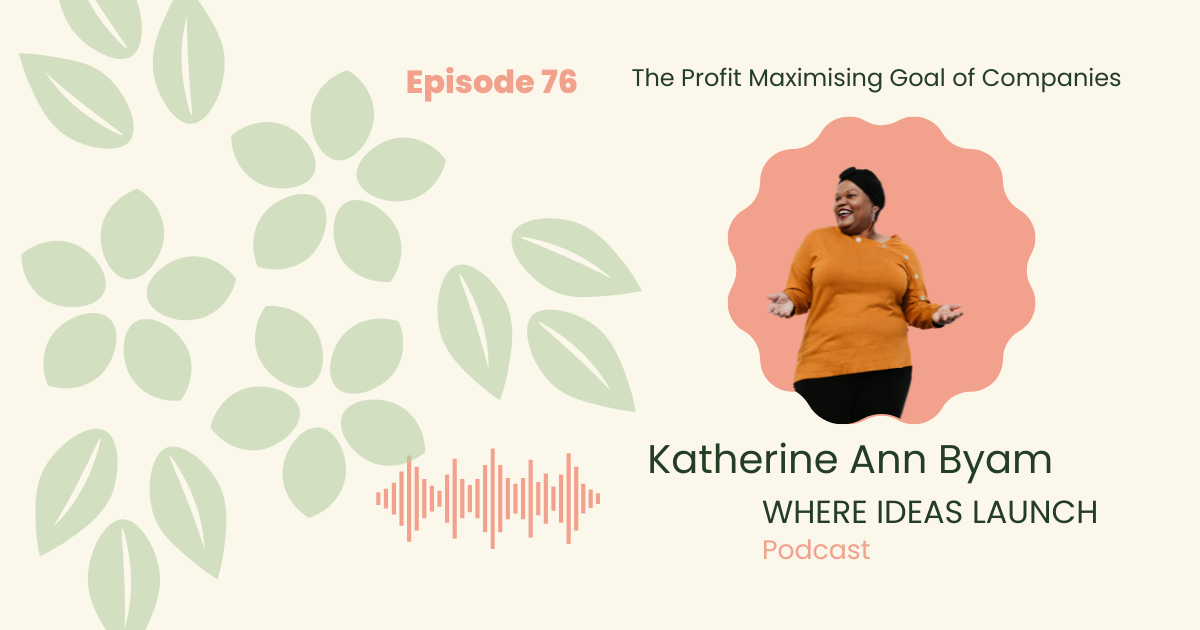
Should companies focus exclusively on maximising profit?
Nothing in life is that straightforward, and certainly not today when our understanding of how our world works has had quantum leaps.
In this episode I explore the legacy of Milton Friedman with some needed food for thought on profit vs purpose.
What does the raging debate around ESG actually mean to you as an economic actor in society?
I’ve been buried in research for my upcoming book - Do What Matters - The Purpose Driven Career Transition Guide, as well as completing a course from University of California, Berkeley - School of Law on ESG, and preparing micro learning on sustainability for the team at Mind Channel.
What’s been central around discussions of late is the role of purpose in organisations, and whether or not boards or shareholders have the right
Since pursuing learning on ESG matters, I've read much on the role of Milton Friedman on the theory of shareholder primacy and the profit maximisation purpose of companies. I've referred often derogatorily to his doctrine, but I’d never read it end to end until recently.
I quote now from his article
“In a free‐enterprise, private‐property system, a corporate executive is an employee of the owners of the business. He has direct responsibility to his employers. That responsibility is to conduct the business in accordance with their desires, which generally will be to make as much money as possible while conforming to the basic rules of the society, both those embodied in law and those embodied in ethical custom. Of course, in some cases his employers may have a different objective. In either case, the key point is that, in his capacity as a corporate executive, the manager is the agent of the individuals who own the corporation and his primary responsibility is to them.”
Now in that quote he talks about the basic rules of society as embodied by both law and custom, but this idea of custom doesn’t work the minute an organisation crosses borders, and even the law isn't uniform, and this again leaves the door open to fuel and incentivize irresponsible corporate action.
Milton Friedman also scoffed at the idea of corporate responsibility - as corporations don't have responsibilities except to the law that created them. but individuals do. Either way, the flaw in much of this article in my opinion is in a lack of integrated systems thinking.
I've listened to countless debates among professors that argue that even when shareholders act in the interest of profit maximisation, they are more likely to develop solutions that address long term social and climate concerns because it is fundamentally within their interest to do so, once ensconced in an appropriate tax structure that considers negative externalities.
Others argue for director primacy, challenging boards to embrace a north start or purpose in balancing the interests of all stakeholders in determining their actions.
You will see from Friedman’s article that he believes this role assigns boards powers they do not have. Whilst Friedman's arguments are interesting and worthy of some design consideration, The arguments remain as academic and removed from real life as are the doctrines of economic theory itself in my opinion.
When economists, lawyers, historians and politicians debate these issues, they are ignoring fundamentally important disciplines from their discourse. We live in a series of interconnected systems. From the individual, the household, the community, the state/county, the country, the global economic system, and all of these are bounded by biological, geological and atmospheric systems that support existence itself.
If we want to debate what's right, appropriate, legal, fair, just, we can't do it in the same bubbles we have in the past, we need the voices of engineers, biologists, botanists, geologists, chemists, artists, physicists, statisticians, theologians, activists and a host of other siloed characters before we even understand how the system works in order to improve it.
We live in the Anthropocene; a widely disputed fact of geology (don't worry I'm not oblivious to the contradiction in this statement), which means that humans now more than any other factor are impacting on climate and other major geological systems on the earth, and increasingly in space. That this is happening isn't inherently a problem; risk always walks in the hands of opportunity.
With the capabilities we have today on data, technology, systems science, modelling, design, we can create a new trajectory for humans within the context of society and natural systems to correct, and potentially reverse the damage we've done by the weaknesses of our past understanding. It will take a strong and compelling desire for a legacy of having a continuously livable earth, at the expense of individual egos.
When Andrew Winston and Paul Polman speak of net positive, this I believe is what they challenge us to envision. When Kate Raworth discusses doughnut economics, I believe she also addresses these gaps. Have a read and share your thoughts below.
“The purpose of business is to profitably solve problems of people and the planet, and not to profit from causing problems.” The British Academy
Perhaps this is the simple idea that we can all get behind!
#esg #sustainability #netpositive #netzero #esginvesting #esgreporting